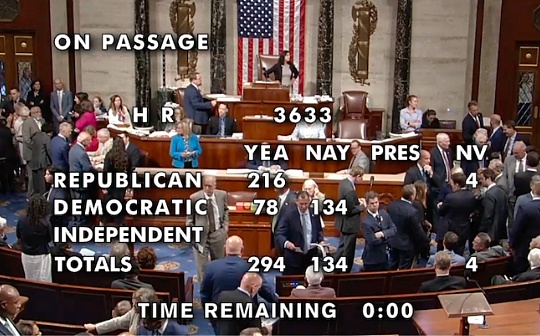
Deng Tong, Bitchain Vision
On Thursday local time, the U.S. House of Representatives passed three cryptocurrency-related legislation, namely the CLARITY Act, the GENIUS Act and the Anti-CBDC Monitoring National Act.The CLARITY Act and the Anti-CBDC Surveillance State Act will be sent to the Senate for consideration.
The GENIUS Act is expected to be signed into law by Trump on Friday local time.The bill will come into effect 18 months after Trump signs, or 120 days after so-called “major federal payment stablecoin regulators”, including the Treasury Department and the Federal Reserve, issued the final regulations to implement the GENIUS Act.
With the implementation of good news about US regulatory policies, the crypto market has ushered in a general rise.BTC once again exceeded US$120,000, and as of press time, it was US$119,986, an increase of 2.6% on the 7th.

Affected by many positive factors, ETH has risen sharply for days and rose sharply this morning, breaking through US$3,600. As of press time, it was US$3,586.23, an intraday increase of 7.5%.
For details, please view the Bitchain Vision article:“ETH returns to $3,000: Six major reasons to boost Is the copycat season coming?”

The entire crypto market is in good shape, with XRP, DOGE, and ADA even recording double-digit gains.

The implementation of US regulatory policies has undoubtedly given a reassurance for the future development prospects of the crypto market.As the GENIUS Act is about to be signed into a formal law by US President Trump, what impact will the bill have on regulators, banking, stablecoin issuers, retail, payment systems, Wall Street financial giants, listed companies, etc.?How do industry insiders view the passage of the bill?Will it bring altcoin season?
1. Review of the content of the GENIUS Act
The seven key points of the GENIUS Act:
-
The bill prohibits any non-“approved payment stablecoin issuer” from issuing payment stablecoins in the United States.
-
The bill defines a “payment stablecoin” as a digital asset that maintains fixed value through fiat currency or other security reserve support.
-
The bill imposes federal standards on institutions that are allowed to issue payment stablecoins, including requirements for fully supporting reserves, reserve quarantine, monthly certification, and capital and liquidity requirements, and prohibition of remortgage.
-
The bill allows state-regulated payment stablecoins issuers to issue stablecoins, provided that the applicable regulatory system is basically similar to the federal system.
-
The bill gives federal banking institutions the power to enforce the issuance of payment stablecoins, similar to the powers of Section 8 of the Federal Deposit Insurance Act to depositary institutions and their holding companies and affiliates.
-
The bill sets out customer protection standards for those who provide custody services for stablecoins approved for payment, including supervision and regulation, funding isolation, mixed prohibition standards, and monthly audit reports of statutory reserves.
-
The bill prohibits federal banking institutions, the NCUA and the SEC from requiring custodial assets to be considered liabilities.The bill also amended the federal securities laws, which clearly stipulate that payment stablecoins are not securities.
The GENIUS Act represents a milestone move by the federal government to regulate the U.S. payment stablecoin industry by creating clear licensing and regulatory requirements.The bill balances federal and state regulatory powers, ensures transparency through audits and reporting, and establishes a clear mechanism for enforcement.
If payment stablecoins are recognized in the U.S. regulatory framework, this could open the door for businesses to issue their own tokens.According to reports, Apple, Google, social media platforms X and Airbnb are studying the matter during the GENIUS debate, and the two U.S. senators question whether Meta will have the same plan if the bill is passed.
The passage of the bill has positive significance in providing regulatory clarity, building a bridge between traditional payments and blockchain, and benefiting the crypto market.Previously, there were articles from Bitchain Vision discussing the content and significance of the GENIUS Act, so I will not elaborate on this.
For details, please view the Bitchain Vision article:“GENIUS Bill passed by the U.S. Senate What impact does it have on the crypto industry?”
2. The impact of the GENIUS Act on various fields
1. U.S. regulators: dual legal framework
The GENIUS Act allows multiple types of regulated entities, such as banks, credit unions and non-bank institutions, to issue stablecoins and establish a dual federal and state legal framework to regulate them.
These entities will be regulated by the National Credit Union Administration, the Federal Deposit Insurance Company, the Office of the Currency Supervision, the Department of the Treasury or the Federal Reserve according to their type.
It is worth noting that if entities issue stablecoins no more than $10 billion, they can choose to be regulated at the state level, but the state does not have to set up stablecoin regulators.
2. Banks: Will be forced to enter infrastructure such as smart contracts
The GENIUS Act puts greater pressure on banks and fintech companies to provide faster and more programmable payment services.The bill will enable regulated stablecoins and fundamentally facilitate real-time settlement, 24/7 capital flows and programmable financial interactions.This method of transferring funds does not require relying on traditional channels such as ACH, wire transfer or even FedNow.
If end users and businesses gradually get used to real-time, programmable payments, banks must also keep up with this trend.This adjustment can be tricky for banks, as many banks need to invest in infrastructure that supports tokenized payments, smart contracts and on-chain compliance.
3. Stablecoin issuer:
1) Apply for a national trust bank license
Logan Payne, a lawyer at Winston & Strawn law firm Logan Payne pointed out that the GENIUS Act incentivizes stablecoin issuers to seek bank licenses, and the new stablecoin licenses under the bill limit the company’s activities to “pure stablecoin issuance”, but most stablecoin issuers do more than that.
“Currently, almost all stablecoin issuers issued in the United States under U.S. law engage in activities outside of the scope of this license.” So even if issuers obtain licenses approved by the GENIUS Act, they still need state-level remittance licenses to operate nationwide.This will incentivize stablecoin issuers to apply for a national trust bank license from the Office of the Comptroller of the Currency (OCC).
2) Unauthorized issuers will be banned
Three years after the bill was signed, it will prohibit any stablecoins issued by unauthorized issuing institutions in the United States.
It is also illegal to provide foreign-issued stablecoins in the United States unless the issuer of a stablecoin can and is willing to comply with the legal requirements of the Act.
The bill provides foreign stablecoin issuers with a range of exemptions, including if the Treasury determines that the country in which it is located has a similar regulatory regime.
3) Disclose monthly reserve report
Institutions approved to issue stablecoins must reserve 1:1 for their tokens in USD or other currency products such as Treasury bills.
The issuer must publicly disclose the composition of these reserves and “after review by a certified public accounting firm” while submitting a proof of the accuracy of the report to a federal or state regulator.
4. Payment system: faces competition
Fed governor Waller said stablecoins bring competition to payment systems but do not see them as a threat.
Researchers at Deloitte believe that stablecoins have the potential to steal the business of traditional financial institutions and bring advantages to emerging fintech companies with experience in digital asset trading.Roy Ben-Hur, head of financial services at Deloitte Digital Assets, said: Once stablecoins occupy a more important position in the payment field, stablecoin issuers such as the Circle Internet Group in New York will have an advantage over traditional financial institutions.
5. Retail: Giants explore the issuance or use of stablecoins
According to people familiar with the matter, retail giants such as Walmart and Amazon are exploring whether to issue their own stablecoins in the United States.Because stablecoins allow merchants to bypass traditional payment methods—traditional payment methods bring them billions of dollars in fees each year, including transaction fees paid by customers when shopping with their bank cards.And stablecoins can speed up the payment process, which can be especially attractive for merchants whose suppliers are located overseas.
6. Wall Street giants: Exploring the issuance of stablecoins
At present, many Wall Street giants, including Citigroup, JPMorgan Chase, Bank of America, Wells Fargo, etc., are exploring whether to jointly issue stablecoins.The move by traditional Wall Street giants to jointly issue stablecoins marks the gradual closer between mainstream finance and crypto finance.
7. Listed companies: Continue to encrypt the treasury
According to Bitwise data, 46 listed companies added Bitcoin to their balance sheets in the second quarter, bringing the total number of listed companies holding Bitcoin to 125.The companies hold 847,000 bitcoins worth approximately $91 billion.

Enterprise Bitcoin adopts data in the second quarter.Source: Bitwise/X
Crypto digital asset investment products recently recorded the second highest single-week inflow, up to US$3.7 billion.This brings the total asset management scale (AUM) of crypto products to a record high of US$211 billion, of which Bitcoin-backed products account for as much as US$179.5 billion, accounting for 85%.
For details, please view the Bitchain Vision article:“From gambling operators to “ETH version micro strategy” to understand SharpLink’s Ethereum treasury”
3. Compliments and doubts from industry insiders
commend
-
Rep. Bryan Steil, Chairman of the Digital Assets, FinTech and Artificial Intelligence Subcommittee: CommentThe GENIUS Act is an important milestone in U.S. crypto policy.“It encourages innovation and development of Web3 business in the U.S., and it has clear rules to ensure consumers are protected and to have clear regulation for businesses to participate in the digital asset ecosystem in a responsible way.”
-
Summer Mersinger, former member of the Commodity Futures Trading Commission and current CEO of the Blockchain Association: Voting on the Anti-CBDC Surveillance State Act demonstratesSupport for “privacy, market competition and personal financial freedom”.
-
USDC issuer Circle: The House of Representatives voted to approve the GENIUS Act to the president for signature, which is crucial to the future of the currency and Internet financial system.This shows strong support for responsible innovation from both parties and clearly statesThe United States will take a leadership role in the regulation of USD-backed payment stablecoins.Circle highly praised the regulatory foundations built by Congress leaders, putting consumer protection, financial integrity and U.S. competitiveness first.
-
Daniel Liu, CEO of Republic Technologies:“We expect two major shifts in the post-GENIUS era. First, financial executives seeking cryptocurrency-denominated returns will increasingly turn to native ETH stakes and transparent re-staked vaults. Second, earnings-generating tokens will evolve into well-defined, auditable assets—similarly different from stablecoins and are not bound by traditional regulatory assumptions. Both trends may increase transaction activity and fee generation in Ethereum, thereby enhancing the long-term value of ETH and strengthening the justification for institutional funds to hold ETH.”
-
Tim Lowe, Strategic Advisor, Bitwise Onchain Solutions:The stablecoin bill could have a greater boost to Ethereum than other networks, as more than half of the stablecoin supply remains in its ecosystem.
question
-
Rep. Maxine Waters, California, said: “The Republican crypto bill we are going to consider will create huge loopholes in our federal financial law, putting consumers and investors at risk in the name of innovation.These bills will increase the possibility of another costly financial crisis, as in 2008, causing trillions of dollars of wealth to evaporate in the name of innovation.”
-
Sean Casten, Democrat:“Central bank officials warned last week that stablecoins threaten global financial stability and require a stricter system than traditional finance.”“The GENIUS Act ignores the opinions of all these experts and instead binds stablecoins to our financial system without the safeguards required by banks and investment companies.”
4. Will the altcoin season usher in?
Eugene Cheung, Chief Commercial Officer of OSL, said: “The resilience of the cryptocurrency market reflects growing confidence among institutional investors. Major companies are rapidly hoarding ETH as part of their reserve strategy, while BTC maintains a steady dominance. SharpLink’s bet on ETH highlights the structural shift in cryptocurrencies as a macro asset class.”
Risk preferences rose after the passage of the GENIUS Act, which is widely regarded as a catalyst for favoring cryptocurrency legislation.Bitcoin once hit a record high and is currently stable at around $120,000.The strong momentum of ETH has driven the rise of other altcoins – altcoins tend to rise simultaneously with ETH during periods of rising market confidence.
Jeff Mei, chief operating officer of BTSE, said:“The altcoin season looks likely to come, especially if the Fed cuts interest rates.”
With the rebound in the ETH/BTC ratio, ETH’s dominance—long overshadowed by BTC’s macro narrative—begins to be reestablished.Given the 24-hour ETH trading volume reached $64 billion and the increasing inflow of ETH-related ETFs, traders are likely to be preparing for the upward trend led by Ethereum in the third quarter.






